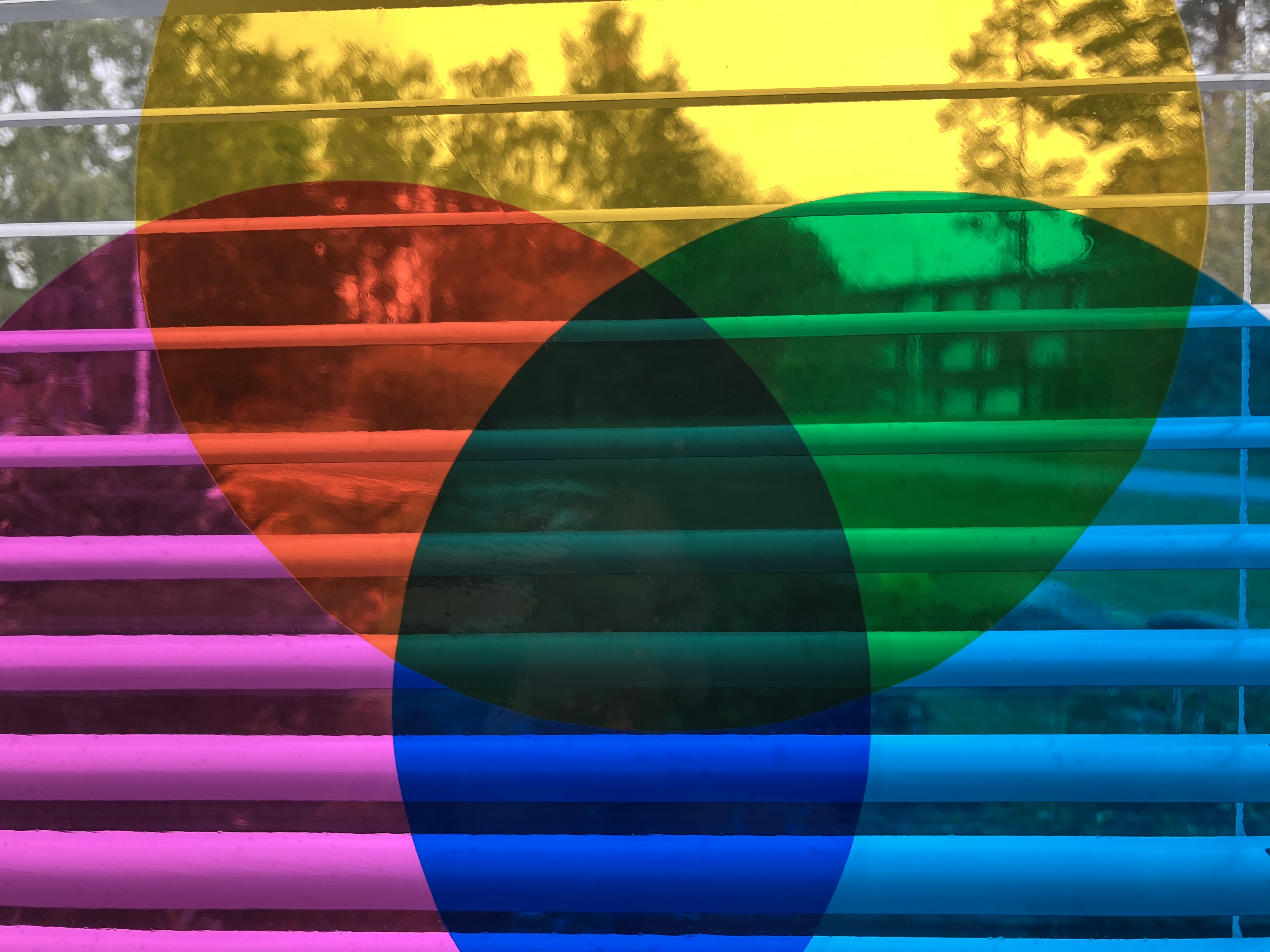
LEARNING OUTCOMES
After the course:
- You have understanding to colour as a visual element in art and design.
- You are well equipped to use colours in your own work and identify colours accurately.
- You are familiar with the connection of colour to mechanisms of visual perception.
- You are able to use the concepts of colour in professional contexts.
Credits: 3
Schedule: 03.09.2024 - 08.10.2024
Teacher in charge (valid for whole curriculum period):
Teacher in charge (applies in this implementation): Sini Vihma
Contact information for the course (applies in this implementation):
Responsible teacher / teacher:
Sini Vihma
sini.vihma@aalto.fi
Workshop master Pauliina Parjanen,
pauliina.parjanen@aalto.fi,
tel. +358 504709277
CEFR level (valid for whole curriculum period):
Language of instruction and studies (applies in this implementation):
Teaching language: English. Languages of study attainment: English
CONTENT, ASSESSMENT AND WORKLOAD
Content
valid for whole curriculum period:
The course combines theory and practice. Lectures on perception and use of colour are combined with practical explorations: exercises on colour interaction and colour composition (executed mainly in colour paper collage), as well as observing and identifying colours.
applies in this implementation
Tue 03.09. 9.15–12.00
9.15–12 Introduction
Colour variables
Assignments:
1 Colours of light and shadow - Image diary----------------------
Tue 10.09. 9.15–17.00
9.15-12 Relativity of colour: Contrast
Light-dark, contrast of hue
Assignments:
2.a) One colour looks like two
2.b) Illusion of transparency - mixing hues
(3. Border contrasts: Aggressive, glowing, vibrating, melting, vanishing etc. borders)13-17 Categorising and ordering colours
Brief introduction to colour order systems
Assignments:
4. Excercises with NCS-Index----------------------
Tue 17.09. 9.15–17.00
Colour in pictorial space
Binocular and monocular cues
Assignments:
5.a)-b) Borders, transparency and depth: spatial effect and spatial illusion.
6. Colour design----------------------
Tue 26.09. 9.15–17.00
Aesthetics of colour: harmony and expression
Concepts of colour harmony: visual comfort and balance, unity of colour variables, etc.
Assignments:
7.a)-d) Analogous colours – visual unity
6. Colour design----------------------
Tue 03.10. 9.15–17.00
Presentations of assignment 1. Colours of light and shadow
Assignments:
6. Colour design, continues
How is it going? Discussions in small groups----------------------
Tue 10.10. 9.15–17.00
9.15-12 Assignments:
6. Colour design, continues
13-17 Presentations of Assignment 6.
Wrap up, Discussion
Feedback
Assessment Methods and Criteria
valid for whole curriculum period:
- Attendance in contact teaching. Completion of the assigned course work by the time set by the teacher.
- Active participation in class work, critiques, and discussions.
- Portfolio that includes the courseworks, notes of lecture etc.
- Personal progress and ability to utilize and express what has been learned.
applies in this implementation
•Course completion requires at least 80% attendance and completion of assigned work given by the teacher by the last day of the course.
•The evaluation is based on personal progress and ability to utilize and express what has been learned. Focus in the evaluation is in the course portfolio, activeness in participation in classroom assignments, and joint discussions.
•Students are requested to notify the teacher via e-mail of any absence due to illness or another serious reason.
•If you are sick, ask for instructions for the assignments of the day(s) of absence and make sure to complete the assignments before the last day of the course.
•The course evaluation follows grading scale 0-5.
5 (excellent)
4 (very good)
3 (good)
2 (satisfactory)
1 (sufficient)
0 (fail)
Workload
valid for whole curriculum period:
Lectures, classroom exercises and critiques 48 h
Indenpendent work 33 h
DETAILS
Study Material
valid for whole curriculum period:
Arnkil, H., Colours in the Visual World (2013)
Albers, J., Interaction of Color (1975)applies in this implementation
- A4-A3 drawing paper, pencils
- paper glue
- hobby knife
- (metal) ruler,
- scissors
- camera, e.g. mobile phone camera
-----------------
- Color-Aid papers (school provides)
- NCS Index (school provides)
Substitutes for Courses
valid for whole curriculum period:
Prerequisites
valid for whole curriculum period:
FURTHER INFORMATION
Further Information
valid for whole curriculum period:
Teaching Language: English
Teaching Period: 2024-2025 Autumn I
2025-2026 Autumn IRegistration:
Priority order to courses is according to the order of priority decided by the Academic committee for School of Arts, Design and Architecture https//www.aalto.fi/en/services/registering-to-courses-and-the-order-of-priority-at-aalto-arts.
Minimum amount of participants is 8 students. Maximum amount of participants is 20 students.
After the registration has closed, SISU conducts a raffle to allocate all the seats while considering the prioritization order stated above. Accepted students must show up on the first course day or inform the teacher in advance of absence to confirm their place in the course.
If there are more registrants than available seats, 10 students from the remaining are drawn and placed on a waiting list in numerical order. These students are informed by e-mail. On the first day of the course, they may check for available seats. The available seats are then filled in numerical order.
